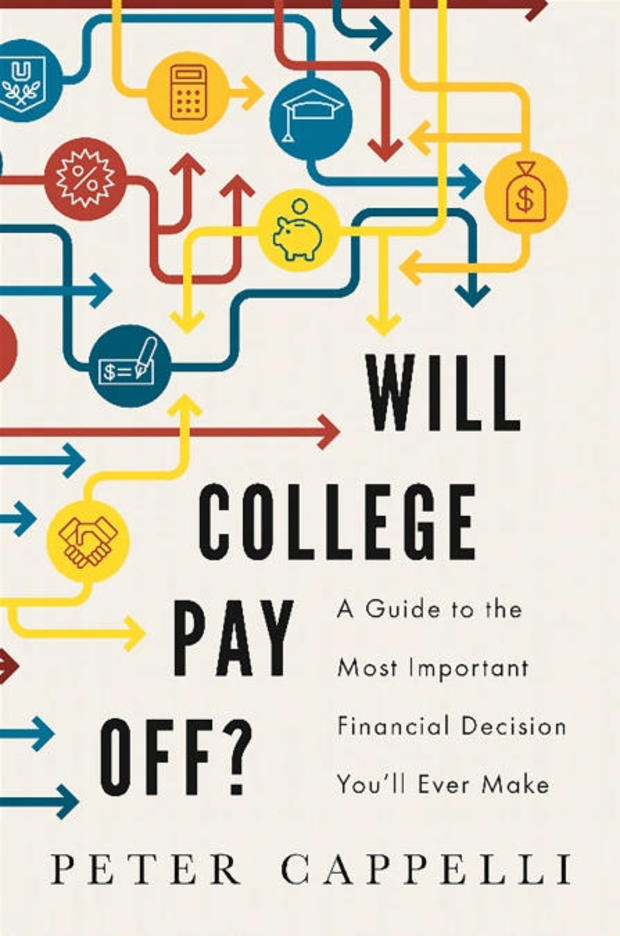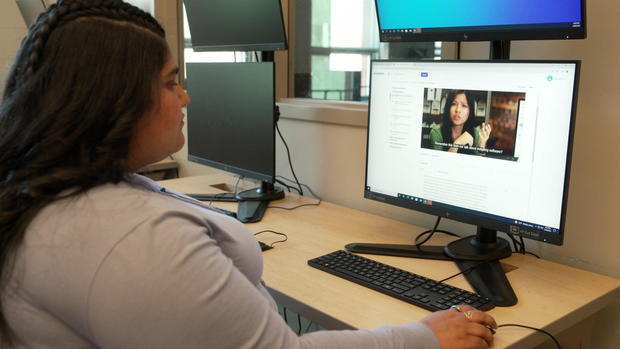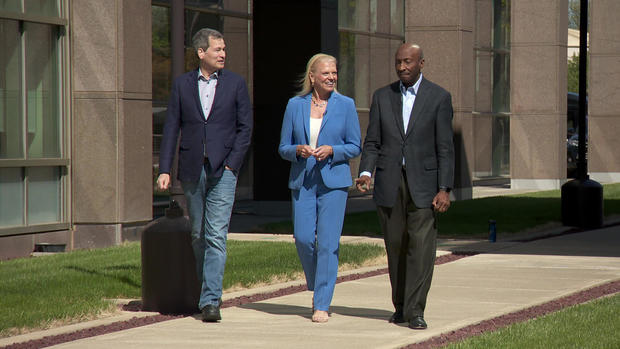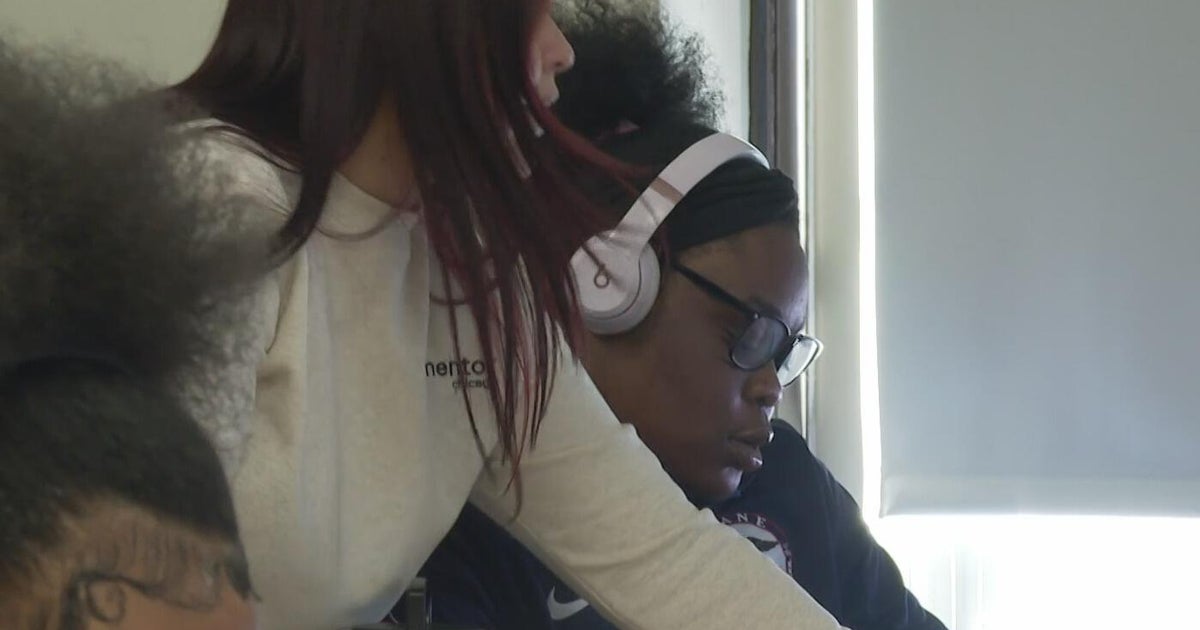Paths to avoid crippling student debt
Twenty-eight-year-old Kera Cheney works for the government, lives in a basement apartment with her boyfriend in San Francisco, and stresses about her college loans. Her student debt now stands at around $280,000.
She followed the classic recipe for success, by graduating from Penn State. But now, she's facing down decades' worth of debt.
Correspondent David Pogue asked her, "Have you ever tried to figure out, 'If I put aside this much a month, this is the year I'll pay off that $280,000'?"
"That would be the goal," she replied. "I've always thought of winning the lottery!"
And Cheney's not alone: 43 million Americans now carry student debt. They owe the government more than $1.7 trillion. About two-thirds of all graduates leave college carrying debt. Many will work their entire careers without being able to pay it off.
Cheney said, "We can't go out as much as we used to for dinners, and we can't take as much trips as we want to unless it's in our budget. So, it does affect us."
No wonder college debt has become a White House priority.
- White House extends pause on student loan repayment through August 31
- With payments paused, canceling student loan debt "still on the table" for Biden administration
One of the reasons for the crisis: sky-rocketing tuition. Another reason: more people going to college in the first place.
- The 50 most expensive colleges in America, ranked
- The cost of delaying college by one year? More than $90,000 over lifetime
According to Peter Cappelli, a professor of management at the University of Pennsylvania's Wharton School of Business, only about 8% of Americans had a college degree in the early 1960s. "And now it's getting close to 40%. So, it's a big difference. You were pretty special in the 1960s if you had a college degree."
Cappelli is author of the book "Will College Pay Off?" So, Pogue asked, "Will college pay off?"
"It depends," Cappelli laughed. "There's no doubt that going to college is incredibly useful for people in terms of improving their lives. What everybody's interested in more is financially: Is this a good investment? Will it pay off in that you'll be better off than a high school graduate? Yeah, if they graduate, for sure. If they don't, maybe not."
Trouble is, most students don't. Only 40% of full-time college students – less than half – graduate in four years. And even if you pause your schooling, your debt keeps right on growing. Cappelli said, "If it takes you six years to graduate, you've got six years of interest accumulation."
So, the old formula (spend four years in college, get financial security) is no longer a sure thing.
But some new formulas are springing up in its place.
Natasha and Stephanie Ramos, who live in Connecticut, are avoiding massive debt. Natasha started her college career inexpensively, with two years at a community college, and finished at a state college. "Connecticut University student debt is way better than private-school student debt," she said. "So, I'll just leave it at that!"
Stephanie attends a vocational high school, where students can learn trades like carpentry, plumbing or hairdressing. But she's taking a shortcut to the corporate world, thanks to the Google Professional Certification program. For $39 a month, she can take video classes that prepare her for a career in technology. "The courses give you a certification at the end that looks very good for employers or for colleges, whatever route you wanna take," she said.
Pogue asked, "By the time you're done with high school, you'd be in the working world at, what, 18 years old?"
"Yup," Stephanie laughed. "Nothing is ever set in stone. Whether you wanna, like, go to college or go straight to the workforce, everything's changing."
Pogue asked their father, Javier, "Do you put any pressure on her one way or another for financial reasons?"
"I support going to college," he replied. "But at a certain point, the last decision is on her."
"Well, seems to be working in your family."
"Thank God!" he laughed.
The Google program has already placed 75,000 workers into well-paying tech jobs at over 150 corporations that are eager to hire them. Meanwhile, opportunities are opening up on the receiving end, too.
Ken Frazier, the executive chairman and former CEO of Merck, and Ginni Rometty, the former CEO of IBM, have led a drive to eliminate the college requirement from as many of their companies' job descriptions as possible.
"Eighty percent of what we call family-sustaining jobs – $60,000 or more generally speaking – require a four-year degree," Frazier said. "And so, companies screen out people, no matter what their intelligence is, their curiosity, their work ethic, their adaptability. But if you don't have enough people to fill all the jobs that we need in this country, I think we have to reexamine it."
Rometty said, "When I became CEO in 2012, we looked at every single job and said, 'Do we need a college degree to start, or could we translate into a set of skills you need?' So, what started as over 90% of jobs needed a college degree, is now less than 50%."
"For example, lab techs and things of that nature, they don't necessarily need a degree in philosophy in order to do the job," said Frazier.
Pogue asked, "Obviously, you're not doing this just because it's the right thing to do; there must be something in it for the corporations?"
"Absolutely; this is not philanthropy," Frazier replied. "At the end of the day, you have people who you can retain longer because they're incredibly loyal, they're hardworking. You can access them for a lot less money."
"And our data has shown that their performance is equal to those with a four-year degree," added Rometty.
"A college degree means you know how to apportion your time; you learn to communicate with others," said Pogue.
Frazier said, "It does. But there are studies that show that people who actually have the right skills training are five times more likely to succeed in the job than people who have a college degree. It's counterintuitive."
"Are you anti-college?"
"We are absolutely not anti-college at all," Rometty said. "It is about just recognizing you may start and go a different path than someone else."
"We know college has lots of value beyond just getting a job," Frazier said. "We think education is a good thing for people. It broadens their perspectives on the world. And what we've seen in these kinds of programs is, eventually a substantial majority of these people go on and get a college degree. They just didn't get the college degree before they entered the workplace. It's a question of sequence, not a question of capability."
To scale up this idea, Rometty and Frazier have founded OneTen, a coalition of 60 major employers, and counting. "OneTen came from the proposition that it would be useful if we sought to hire one million Black Americans who lack a four-year college degree over ten years, into family-sustaining jobs," Frazier said.
The coalition works with community colleges, job-training organizations, and apprenticeships, persuading them to train young people for precisely the kinds of jobs that need filling. Rometty calls them "new-collar jobs."
New programs, new sequences, new collar workers – for some careers it's all part of a new wave of alternative paths that don't involve college … or college debt.
As for Kera Cheney, she has a long-range plan: "I really want to go to law school," she said. "If I can start making higher money, then I can afford my monthly payments."
So, Pogue asked, "Was college worth it for you?"
Cheney paused. "I mean, I had fun in college. It was a great experience. But for the lifetime of debt I'm gonna be living with … (sighs) That's so hard. That's such a difficult question."
For more info:
- Peter Cappelli, University of Pennsylvania's Wharton School of Business
- "Will College Pay Off?: A Guide to the Most Important Financial Decision You'll Ever Make" by Peter Cappelli (PublicAffairs), in Hardcover, eBook and Audio formats, available via Amazon, Barnes & Noble and Indiebound
- OneTen Coalition
- Google Professional Certificates
Story produced by Gabriel Falcon. Editor: Joseph Frandino.






